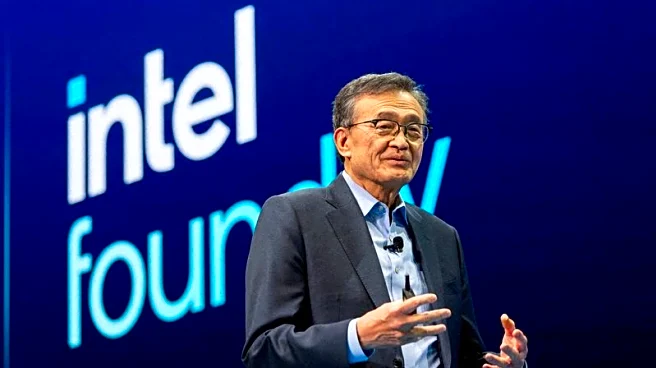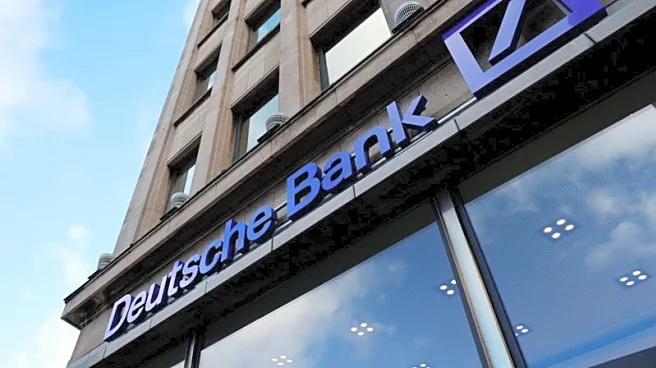By Ross Kerber
(Reuters) -The U.S. government's new stake in Intel is making some investors nervous that President Donald Trump's deal heralds an era of government meddling in private industry, particularly
as the arrangement followed Trump's call for the resignation of the computer chip maker's CEO.
The deal, announced on Friday, converts $11.1 billion in Chips Act grants and other government funding into a 9.9% equity stake in Intel. The company's press release announcing the deal included statements from the CEOs of Microsoft, Dell and other companies praising the move.
Investors said this level of tractability was not usually associated with relations between businesses and Washington. Trump had said on social media that Intel CEO Lip-Bu Tan wanted to keep his job and "ended up giving us $10 billion for the United States."
"It sets a bad precedent if the president can just take 10% of a company by threatening the CEO," said James McRitchie, a private investor and shareholder activist in California who owns Intel shares. The statement, he said, effectively sends the message that "we love Trump, we don't want 10% of our company taken away."
Intel shares closed at $20.41 on August 6, the day before Trump called for Tan's resignation, and trended upward to finish at $24.56 on August 15, the last trading day before Trump's terms surfaced. On Tuesday, Intel closed down 1% at $24.35. The deal does not give the U.S. Commerce Department board seats, according to a securities filing, and it requires Commerce to support the board on director nominees and proposals. But Commerce can vote "as it wishes" on several other matters.
Fitch Ratings said the deal does not improve Intel's BBB credit rating, which sits just above junk status. While it provides more liquidity, it does not fundamentally improve customer demand for Intel chips, Fitch said in a research note Tuesday.
REDUCED VOTING RIGHTS
Intel's filing also states the deal dilutes existing shareholders, reduces their voting rights, and could subject the company to additional regulations or restrictions in other countries. What's more, CEO Tan said Intel did not need the money. SoftBank poured $2 billion into the chipmaker three days before the Trump announcement.
This was the latest extraordinary intervention in a private corporation by Trump's White House, following a military deal for a mining company stake announced in July and influence over U.S. Steel as part of its purchase by Japan's Nippon Steel . On Tuesday U.S. Commerce Secretary Howard Lutnick said the Trump administration may take stakes in defense contractors.
Yet the U.S. moves could be seen as business as usual in a number of European and Asian countries whose governments already own chunks of major companies. The German state of Lower Saxony has a 20% stake in Volkswagen, for instance.
“This has been going on for years with the Japanese government, the Korean government, the Taiwanese government, the Singaporean government, the Malaysian government," said Richard Hardegree, vice chairman of technology investment banking at UBS. “In Italy, in France, they've done massive amounts of industrial policy around the semiconductor industry ... for 40 or 50 years, ever since everybody figured out the semiconductor is important."
During the 2008-2009 financial crisis, Washington also took equity positions in several endangered vital companies, but those arrangements were temporary. Pressuring otherwise healthy companies for long-term ownership stakes was unprecedented, and the move has alarmed some investors.
BLURRED LINES
Rich Weiss, senior vice president and chief investment officer of multi-asset strategies for American Century Investments, said future federal investments "will need regulations and guidelines to limit the opportunities for abuses such as insider trading."
"In an unchecked scenario of government direct investing, trading in those companies could be much riskier for investors," he said.
Several investors and representatives cited similar risks such as when boards weigh competing interests on decisions such as where to locate a new plant, whether to lay off workers, or how hard to press into overseas markets.
Company and national goals could easily conflict on such matters, said Robert McCormick, executive director of the Council of Institutional Investors, whose members include state pension funds and other big shareholders.
"A government stake in an otherwise private entity potentially creates a conflict between what's right for the company and what's right for the country," he said.
Kristin Hull, chief investment officer of California-based activist firm Nia Impact Capital, said she has "more questions than confidence" about the equity stake. Nia manages shares in Intel for clients and its funds own stakes in other chipmakers including Taiwan Semiconductor Manufacturing and Advanced Micro Devices.
“I think the lines between where is the government and where is the private sector, we’re really blurring some lines here,” Hull said in an interview.
An Intel representative said the company's board approved the deal to issue shares. The representative did not comment further. Asked about insider trading concerns, the representative cited a line in the press release that the U.S. government will have no board representation or “other governance or information rights.”
A representative for Microsoft declined to comment. Representatives for Dell did not respond to questions.
One large institutional investor, speaking on condition of anonymity because of the sensitivity of the situation, said the deal could protect Intel from pressure by activist investors.
But the person cautioned that if the U.S. government keeps taking stakes in other companies, that could be a worrisome step toward state capitalism.
“Seeing it happen once, for a company like this, doesn’t raise red flags, it raises an eyebrow. But if this becomes a tool that becomes more widespread, we’ll have to take a look at why this tool is being used and why the capital markets aren’t providing financing,” the investor said.
(Reporting by Ross Kerber in Boston and Dawn Kopecki in New York. Editing by Dawn Kopecki and David Gregorio)









